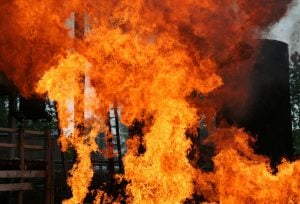Six Heating Safety Tips to Prevent House Fires During Cold Weather

The US has seen some of the coldest weather in recent memory during the last few weeks. Two weeks ago, North Carolina and other parts of the US experienced temperatures that were well below freezing. You probably relied on portable or installed heating devices to escape the cold weather. House fires increase during the cold weather months as more people rely on these devices to stay warm. You could reduce the chances of a house fire by following these six safety tips.
- Never plug portable space heaters into power strips. Space heaters can overload power strips and cause fires. These devices should only be plugged into wall outlets with a sufficient capacity. This means the outlet can handle the electrical demands required by the space heater.
- Keep objects away from space heaters. Some house fires are caused when space heaters are too close to flammable objects, such as furniture or draperies. Flammable objects should be kept away from space heaters.
- Never leave portable heating devices unattended. Always turn off space heaters or other portable heating objects before going to bed or leaving the room. You would need to respond quickly if the device caused a fire.
- Perform a smoke alarm inspection. Smoke alarms will not prevent house fires. However, they could help you keep a fire from spreading. You should perform tests on your smoke alarms once per month.
- Practice basic fireplace safety. Clogged chimneys can cause fires. You can have your chimney inspected each year to prevent combustible residue from accumulating. Screens can be installed on fireplaces to prevent embers from flying into the room. Always keep flammable objects a safe distance from a lit fireplace.
- Have your heating equipment serviced. According to the National Fire Protection Association (NFPA), stationary heating equipment should be inspected annually by a certified professional. Water heaters and other central heating equipment could cause fires or carbon monoxide poisoning when they malfunction.
North Carolina and the rest of the US could still experience cold weather for weeks. During this time, it is important to remain vigilant of the fire risks that could exist in our homes. We hope this blog can help improve the safety of you and your loved ones.
At Riddle & Brantley, LLP,
Safety Counts.
 The US has seen some of the coldest weather in recent memory during the last few weeks. Two weeks ago, North Carolina and other parts of the US experienced temperatures that were well below freezing. You probably relied on portable or installed heating devices to escape the cold weather. House fires increase during the cold weather months as more people rely on these devices to stay warm. You could reduce the chances of a house fire by following these six safety tips.
The US has seen some of the coldest weather in recent memory during the last few weeks. Two weeks ago, North Carolina and other parts of the US experienced temperatures that were well below freezing. You probably relied on portable or installed heating devices to escape the cold weather. House fires increase during the cold weather months as more people rely on these devices to stay warm. You could reduce the chances of a house fire by following these six safety tips.